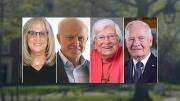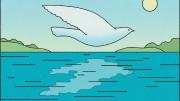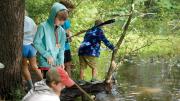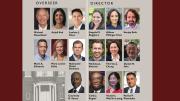In the year and a half between college (at Harvard) and graduate school (at MIT), Roger Fu ’09 lived in an isolated village in the mountains of southern Chile, learning to speak Mapuche with his neighbors and studying indigenous astronomy. People there, he says, understood the stars “based on their role in the night, rather than the physical object”: a star rising at 8 p.m. always carried the same name, even as the earth and heavens rotated. And, he observed, “When you talk about astronomy, everyone’s interested. Understanding what’s in the sky, where everything came from—it’s part of the human need.” For him, too: now Loeb associate professor of the natural sciences in the department of earth and planetary sciences (his undergraduate concentration), Fu studies paleomagnetics, analyzing “the oldest possible rocks”—found in places like northwestern Australia, South Africa, Canada, and Minnesota—to reconstruct magnetic fields from eons ago. In the 1950s, paleomagnetics provided early evidence of plate tectonics, and in a recent study, Fu determined that the continents were in motion at least 3.25 billion years ago, 500 million years earlier than previously thought. He has analyzed Martian meteorites and found that the planet had a strong magnetic field 3.9 billion years ago, which would have supported a thicker atmosphere—and a wetter, more habitable surface. All this research is enabled, Fu says, by the Quantum Diamond Microscope, a magnetometer developed in his lab that can measure tiny samples and identify specific magnetized particles. Describing it, Fu sounds as excited as he was at 11, when he received a telescope for Christmas and stumbled across Jupiter, with its moons and cloud belt, on the first night. He still stargazes for fun—Harvard Forest is a favorite spot—but after having a son last fall, his gaze is more often nearer to home.
Roger Fu
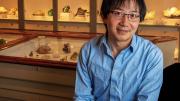
Roger Fu
Photograph by Stu Rosner
You might also like
Veteran MIT Administrator Named University Secretary
Suzanne Glassburn will manage the work of the Corporation and Board of Overseers.
The 2025 Pulitzer Prizes Announced
Winners across five categories, from commentary on Gaza to criticism on public architecture
Harvard Medalists
Four people honored for exceptional service to the University
Most popular
Explore More From Current Issue
Biology's "Mirror Organisms"—And Their Dangers
Life forms built from left-handed DNA and RNA could threaten Earth’s plants, animals, and insects.
Vote for the Board of Overseers and the Harvard Alumni Association Elected Directors
Overseer and HAA Elected Director Slate 2025


